牛津英语模块三Unit3 Reading
牛津版高中英语模块3课文对照翻译

Unit 1FogFog warningWhen Polly left home that morning, the city was already covered in a grey mist. At lunch, the radio forecast that the mist would become a thick fog in the afternoon. At four o'clock, Polly left work and stepped out into the fog .She wondered if the buses would still be running.No buses to King StreetOnce out in the street, she walked quickly towards her usual bus stop.‘ How far are you going?’ the bus conductor asked her before he took her fare.‘ King Street.’ said Polly.‘ Sorry , Miss ’ replied the man, ‘ the truth is that it is too foggy for the bus to run that far. Take the Underground to Green Park. The weather might be better there and you might be able to get a taxi. ’A tall manAs Polly observed the passengers on the train, she had a feeling that she was being watched by a tall man in a dark overcoat. At last the train arrived at Green Park station. While the rest of the passengers were getting out, she glanced at the faces around her. The tall man was nowhere to be soon.FootstepsWhen Polly got to the station entrance, it was empty. Outside, wherever she looked the fog lay like a thick, grey cloud. There was no one in sight. Polly set off towards ParkStreet. As she heard a man’s voice in her ear saying ‘Sorry.’ The man mo ved away. She could feel her heart beating with fear.The helpful strangerThen she heard the sound again-soft footsteps behind her. A minute before, she had wished for someone to come along. Now she wanted to run, but fear held her still. The footsteps se emed close now. Then a man’s voice came out of the darkness. ‘Is anybody there?’Polly hesitated. At last she answered, ‘Hello, I think I’m lost. ’A few seconds later, a hand reached out and grasped her arm. Polly found herself staring up at the face of an old man with a beard.‘ Maybe I can help you. Which road do you want?’ he asked.‘ I live at 86 King Street.’ Polly replied.‘ Just take my hand.’ said the man. ‘Come with me. You’ll be all right.’ He took Polly’s hand. ‘Watch out for the step here.’In his other hand the man carried a stick. Polly heard it hit the step. ‘I can remember some terrible fogs, but maybe that was before your time. I can’t see your face, but you sound young. How old are you?’‘ Just twenty.’ answered Polly.‘ Ah, twenty ! A nice age to be. I was young once. Now we’re at the crossroads. Turn left here.’‘ I’m quite lost now. Are you sure you know the way?’ Polly was beginning to feel frightened again.’‘ Of course. You really shouldn’t feel anxious,’ He held her hand more firmly.The grateful helper‘ Here we are. King Street.’ He stopped.‘ Thank you so much for coming to my aid.’ said Polly in relief. ‘Would you like to come in and rest for a while?’‘ It’s very nice of you.’ said the man, ‘but I’ll be off. There may be more peo ple lost today, and I’d like to help them. You see, a fog this bad is rare. It gives me the chance to pay back the help that people give me when it’s sunny. A blind person like me can’t get across the road without help, except in a fog like this.’P18ProjectShark attacksThere are nearly 400 different types of sharks, but only about 30 types are known to have attacked human beings. Many people know that the most dangerous shark is the great white shark, probably because they have seen the film Jaws. However, two other sharks are also rather dangerous: the tiger shark and the bull shark. Contrary to what many people might assume, evidence shows that sharks seldom attack humans. There are three types of sharkattacks. In the main type, the shark attacks you because it mistakes you for a fish, but when it tastes human flesh it decides to give up and swims away. In the second type, the shark pushes you with its nose to find out if you are fit to be eaten, and then bites you if it thinks you are. In the third type, the shark waits for you to swim by, and then attacks you suddenly. The last two types of attack more often result in the death of humans.To reduce the risk of a shark attack, you should follow these suggestions.Do not swim in the dark. Sharks can still see you but you cannot see them.Do not go swimming in the ocean if you have a fresh wound. Sharks can smell blood over a long distance.Do not wear bright clothing or jewellery, because sharks are attracted to the flash of, colours and bright objects. Stay in groups, as sharks usually avoid large numbers of people.Recently, shark attacks have been increasing as water sports are becoming more popular. If a shark attacks you, follow the advice below.Keep calm. Do not panic.Hit the shark on the nose with your fist.Stick your finger in the shark's eye.Don't be frightened by sharks: youare 3o times more likely to be hit by lightning than be attacked by a shark.The wonderful world of pigeonsIt is night. All is quiet. The soldiers are asleep while a guard watches for theenemy. There is a flash, and the sound of guns! They are being attacked!Hundreds of enemy soldiers rush towards them. They are all going to bekilled unless they get help. What should they do?An officer writes a short message quickly on a small piece of paper: 'Beingattacked! Hurry!'He rolls up the paper and puts it into a small case, and then reaches into a cage and gets a bird. Attaching the message to its leg, he sets the bird loose. It immediately flies into the air and disappears in the dark.Will the bird arrive in time? Will they be saved?Though it may seem hard to believe, the bird the officer uses is the same bird often seen in public parks--the pigeon. Pigeons have a wonderful sense of direction and can find their way home over long distances. Indeed, pigeons have been known to fly home from as far away as 1,800 kilometres. That is why pigeons have been used since ancient times to carry the news or even the mail. However, it was in war that they found their greatest use. During both World War I and II, pigeons were employed by armies to carry messages to and from the front lines, saving the lives of many soldiers and even helping win some important victories.How do pigeons find their way? Pigeons appear to have a compass inside them that tells them which way is north. How this compass works remains a mystery. Of course, since a compass alone is not enough to find one's way, they also appear to use their sight and even their sense of smell to tell them which way they should go. Unlike humans, they never get lost and canalways find their way home.Unit 2English and its historyAll through history, people from many different countries and cultures have lived together in Britain. The English language is made up of the grammar and vocabulary these people brought to Britain. That is why English has so many difficult rules that confuse people.Old EnglishOld English is very different from the English we speak nowadays. In fact, we would not be able to understand it if we heard it today. Before the 5th century, people in Britain all spoke a language called Celtic. Then two Germanic groups from the European mainland— the Angles and the Saxons— occupied Britain. Old English consisted of a mixture of their languages. (Both the English language and the English people are named after the Angles; the word Angle was spelt Engle in Old English. Aside from place names such as London, very few Celtic words became part of Old English. At the end of the 9th century, the Vikings, people from Northern European countries such as Denmark and Norway, began to move to Britain. They brought with them their languages, which also mixed with Old English. By the 10th century, Old English had become the official language of England.When we speak English today, we sometimes feel puzzled about which words or phrases to use. This is because English has many words and phrases from different languages, but with similar meanings. For example, the word sick came from a word once used by the Angles and the Saxons, while ill came from a word once used by the Norwegians.Middle EnglishMiddle English is the name given to the English used from around the 12th to the 15th centuries. Many things played a part in the development of this new type of English. The most important contribution was from the Normans, a French-speaking people who defeated England and took control of the country in 1066. However, the Norman Conquest did not affect English as mush as the Angles and the Saxons’ victory about 600 years earlier, which led to Old English replacing Celtic. Even though the Normans spoke French for the entire 250 years they ruled England, French did not replace English as the first language. On the other hand, the English language did borrow many words from French. This resulted in even more words with similar meanings, such as answer (from Old English and reply (from Old French. It is interesting to learn how the words for most animals raised for food, such as cow, sheep and pig, came from Old English. However, the words for the meat of these animals, which was served to the Normans, came from Old French: beef, mutton, pork and bacon.Old French made other contributions to Middle English as well. In Old English, the Germanic way of making words plural was used. For example, they said housen instead of houses, and shoen instead of shoes. After the Normans took control, they began using the French way of making plurals, adding an -s to house and shoe. Only a few words kept their Germanic plural forms, such as man/men and child/children.After the Norman Conquest, high-class people spoke French while common people spoke English. However, by the latter half of the 14th century, English had come into widespread use among all classes in England. In 1399, Henry Ⅳ became King of England. His mother tongue was English, and he used English for all official events.Modern EnglishModern English appeared during the Renaissance in the 16th century. Because of this Modern English includes many Latin and Greek words. Pronunciation also went through huge changes during this period. Of course, this was not the end of the changesin the English language. The question of whether English will keep on changing in the future is easy to answer. It is certain that this process will continue, and people will keep inventing new words and new ways of saying things.ProjectThe development Chinese charactersThe Chinese language differs from Western languages in that, instead of an alphabet, ituses characters which stand for ideas, objects or deeds. Chinese words are formedbyputting together different characters. In many cases, a single character can also make up aword. The history of the Chinese language can be examined by looking athow these characters developed.Chinese writing began thousands of years ago. According to an ancientstory, a man named Cang Jie invented Chinese writing. One winter daywhile he was hunting, he saw the tracks of animals in the snow andobserved that the appearance of each one was different. Then he had theidea that he could use different shapes to represent different objects. Thefirst Chinese characters were drawings of physical objects. Some charactershave been simplified and others have been made more difficult over time.However, as a whole, the characters have developed from drawings intostandard forms. The character for a mountain was at first three mountaintops together.This became one mountaintop and three lines, and over time turned into the characterused nowadays.Not all characters were developed from drawings of objects. Sometimes to express ideas,some characters were made by combining two or more characters together. For example,'rest' was made up of the characters for a man and a tree. The character 'prisoner' wasformed with a 'man' inside a square. Other characters were developed for directions and numbers. It is easy to distinguish their meanings by looking at them, for example, thecharacters for 'up' and 'down', which are opposites of each other.Though these kinds of characters indicate meanings, one of their shortcomings is thatthey do not show how they should be pronounced. Therefore, a method was developedto have one part of a character indicate the meaning and the other suggest thepronunciation. Many Chinese characters used today were made this way.In the 1950s the Chinese government introduced simplified Chinese characters and nowthey have widespread use in China's mainland.The story of BrailleUsually, when we talk about reading, we think of using our eyes to see letters written in ink on paper. However, this is not always true. For example, blind people cannot see, but they can still read books.The man who introduced blind people to reading was Louis Braille (1809-1852. Braille lost his eyesight at the age of three as a result of an injury. When he was ten, he went to a school for the blind in Paris. In those days, books for blind people used paper pressed against metal wire to form letters. Since the metal wire was heavy, each book weighed as much as 100 pounds. The whole system was not convenient for use. Indeed, the school library only had fourteen such books in it. In 1821, a soldier visited the school and showed the students a system for passing messages at night during times of battle. His system used paper with small, raised dots that could be felt with the fingers. Each letter of the alphabet was represented by a different pattern which consisted of twelve dots. The soldiers would drag their fingers over the raised dots to read the message. While the students found the soldier's idea interesting, the system was too difficult to be of practical use. However, young Louis Braille took the idea and worked on it. At the age of fifteen, he created a system with patterns of six raised dots representing each letter.'Braille', the system for reading used today by blind people around the world, was thus born.The blind can easily recognize Braille with the fingers. They can also easily write in Braille with a special typewriter. Today, it is the most common system used by blind people for reading and writing, and nearly every language, including Chinese, has its own version of Braille for its people to use.Unit 3Lost civilizationsDay 1,15 JulyI feel lucky to have won a place on this trip. We are in Italy now, and tomorrow we are visiting Pompeii. Next week we are flying to China, and going to Loulan, which is known as China’s Pompeii in the desert. Both Pompeii and Loulan became lost civilizations long ago.Day 2,16 JulyThis morning we attended a lecture about Pompeii. The city was founded in the 8th century BC. In 89 BC, the Romans took over Pompeii. It then became a rich and busy city. Near the city was a volcano. On 24th August AD 79, the volcano erupted and lava, ash and rocks poured out of it onto the surrounding countryside. It continued to erupt for the next two days. Many people were buried alive, and so was the city. How unfortunate!Day 3,17 JulyToday I saw the ancient Roman city of Pompeii as it was 2,000 years ago. How amazing! The city was forgotten for many years until the 18th century when a farmer discovered a stone with writing on it. People started to dig in the area for treasure, which caused much damage. Thus, in 1860, the area was put under government protection so it could be preserved and studied.When I walked around the city, I saw streets just as they had been, with stepping stones along the road so you did not have to step in the mud on rainy days! I saw several houses which were decorated with wall paintings. I also saw the people who had been buried alive. It turns out that after the ash covered the people who failed to feel the city, their bodies nearly completely broke down and disappeared, leaving empty spaces toproduce true-to-life figures of the people who had died in the disaster. You can see them today in Pompeii , in the same place where the people feel. The volcano is still there, but looks very quiet now. It’s hard to imagine how this peaceful volcano destroyed the whole city!Day10,24 JulyFinally, we arrived in Loulan after several days of travelling. This commercial city was busy and wealthy about 2,000 years ago. It was a stopping point on the famous Silk Road between the East and the west. It is believed to have been gradually covered over by sandstorms from AD200 to AD400. I am so excited to be here!Day11,25 JulyAn scholar from the local cultural institute, Professor Zhang, told us that around the year 1900 the European explorer Sven Hedin discovered the ruins of the Loulan Kingdom. Seven found the remains of buildings buried beneath the sand, together with a lot of treasures, including coins, painted pots, materials such as silk, documents and wall paintings. When we went to the city, we saw the city walls, palaces, temples, workshops and towers. We found the ruins most interesting. There was an ancient water system that ran through the middle of the city. The desert was once a green land with huge trees, but they were cut down and that resulted in the city from being buried by sand— what a pity!ProjectAncient Greek statue found in XinjiangResearchers announced the discovery of a small statue in northern Xinjiang, China, recently. The metal statue is of a Greek soldier. When asked how a statue from distant Greece could have appeared in China, researchers explained that no doubt this was a result of Alexa nder the Great’ s influence.Alexander the Great (356-323 BC was the son of a Greek king who defeated many Greek cities in battle. At the age of twenty, Alexander himself became king after his father died. However, many cities rose up against Alexander, so he led an army to take them back. Though his army had only 3,000 troops, he won every battle and many enemy soldiers joined him.In 334 BC, he took his army, now with 42,000 men, into the Middle East and then Egypt, defeating every army that stood in his path. Then he turned his eyes east, and marched all the way to India, finding victory wherever he went. It seemed that nothing could stop him from taking control of the entire world. However, his own army grew tired of endless battles and refused to go any further, so he had to turn back. By the age of thirty, he had already occupied more land than anyone before, and it seemed that more glory was waiting ahead of him. Yet, in 323 BC, he came down with a fever and died. Since he had no son, his generals divided his vast kingdom among themselves. Alexander the Great spread the Greek culture from Europe to Africa and Asia, influencing the world for centuries to come. The statue of the Greek soldier found in northern Xinjiang probably came to China in the 4th century BC as a result of trade. Like many other ancient objects that show a Greek influence, it can now be seen in a museum in Urumqi.The father of Western philosophyThe word 'philosophy' means 'love of wisdom'. Philosophy can be thought of as a way of looking at the world around us, or of answering the great questions of life, such as 'Why are we here?' and 'What is truth?'The father of Western philosophy was Socrates (469-399 BC. Socrates was from Athens, in Greece. When he was young, he was a brave soldier. Later, he became a teacher, but he taught for free and earned his salary from being a common worker. Aside from this, we know very little about him. Since he never wrote a book, we also know very little about his philosophy. Yet, Socrates has had a deep influence on Westernthought and science. To understand how this can be true, we must understand how Socrates taught. Socrates taught by asking questions. Through this, he challenged his students to develop and explain their own arguments. In many cases, his questions made his students aware of their own errors. Many students got embarrassed and even angry when this happened, while others changed their opinions. Socrates' way of approaching the truth is now called the Socratic Method. The idea of asking questions until you reach the right answer is the basis of modern philosophy and science.Unfortunately for him, Socrates questioned too much. He always asked challenging questions to everyone he met, upsetting many people in Athens. Finally, some people had had enough of him, so they took him to court for questioning the existence of the Greek gods and for corrupting the young people of Athens. At his trial, he defended himself by asking his judges yet more questions.This just made a bad situation worse. Finally he was put to death by being forced to drink poison. Through his death, Socrates became the hero of all people who search for the truth.Appendix I: TranslationUnit 1Reading雾比尔·洛浓雾警报那天早晨波莉离家时, 整个城市已笼罩在灰色的薄雾中。
牛津英语模块三UnitReading共28页文档
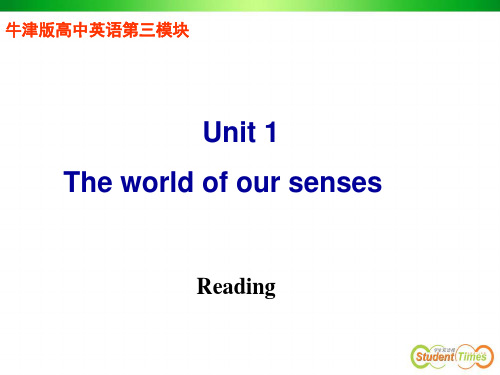
fear
ask for
danger
help
fog
get lost
confuse
blind
accident
1.What is the story about?
A young lady in the fog.
2.Where did Polly live?
At 86 King Street.
3. Who helped Polly?
Polly's thought or feeling
Outside Polly's Part 1 work place
At 4 p.m. foggy
her face. 8 8. Polly got to King Street safely. 1 9. Polly left the office at four o’clock. 10 10. The old man went to help others .
Word study
1. forcast 2. fare 3. narrow 4. stare 5. watch out for 6. relief
牛津版高中英语第三模块
Unit 1 The world of our senses
Reading
Fog
What’s the weather like in these pictures?
What can you think of when the word “fog” is mentioned?
An old blind man.
4.What was the old man carrying?
A stick.
True or false
牛津高中英语模块3 Unit 3 Reading
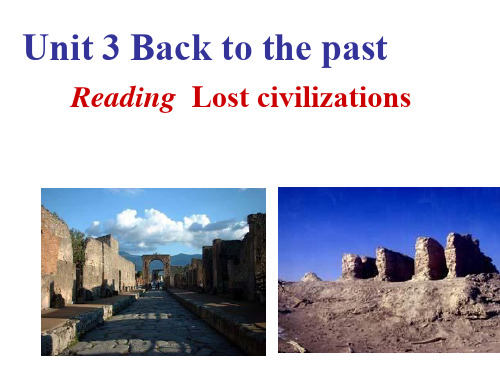
Compare Pompeii with Loulan
City
Pompeii
Loulan
A farmer found some stones with writing on it. In 1860, the area was put Discovery under government protection.
(5)_A__E_u__r_o_p_e_a_n______ _e_x_p_l_o_r_e_r_d_i_s_c_o_v_e_r_e_d_ _th__e_r_u_i_n_s__o_f_t_h_e_____ _L_o_u__la_n__K__i_n_g_d_o_m____
_r_o_u_n_d__t_h_e__y_e_a_r_1__9_0_0.
17th July
I saw the ancient Roman city of Pompeii
How amazing!
24th July
We arrived in Loulan
So excited to be here!
25th The discovery of Loulan July and its present situation What a pity!
the past? Why or why not?
While some people believe that… I see the benefits of it. While some people believe that… I see the disadvantages of it. For one thing…, for another…,on top of that…
So we call the ancient buildings, cultures and countries that no longer existed “Lost civilizations”.
牛津译林版 模块三Unit3 reading(共38张PPT)

Mount Vesuvius erupted and lava, ash and rocks poured out of it onto the surrounding countryside. All the people in Pompeii were buried alive, and so was the city.
3. appearance---a, pear, ear an eyesight---eye, yes, sight sandstorm--sand, an, and, storm, or, a
Unit 3
Reading(1)
Back to the past
architecture art
civilization
Modul3 Unit3 Long Shufeng
Proverbs and idioms
All roads lead to Rome.条条大路通罗马。 Rome was not built in a day.罗马非一日建成。
When in Rome, do as the Romans do.入乡随俗。
Questions
2. How was the buried city discovered?
A farmer discovered a stone
with writing on it.
People started to dig in the area for treasure,which caused much damage.
Loulan was buried beneath the sand.
Unit3Extendedreading知识点及讲解课件-高中英语牛津译林版选择性必修第三册

Pre-reading
Let’s look at the title and predict what the article is about.
3
While-reading
Fast reading
Intensive reading
美国“亚利桑那号”战列舰 被...唤醒/吵醒
Para.6
After the attack
infamy n.臭名昭著;声名狼藉;恶行;罪恶 infamous adj.声名狼藉的;无耻的;邪恶 的;不名誉的
标注着...... 沉船的残骸
为......祈祷
Para.7
Now
在......底部
memorial a memorial to ......的纪念碑 serve as a memorial to 成为......的 纪念馆/纪念物 pray to 向......祈祷
Important words & phrases
7
升上天空
8
笼罩在海面上
9
感到血液凝固
10 回过神来,苏醒过来
11 冲到甲板上
12 片刻之后
rise into the sky hang over the sea feel one’s blood freeze come to oneself rush up to the deck moments later
Para.4
During the attack
bleed
stop the bleeding 止血 bleed for sb. 为某人流血;
对某人表示同情,体谅某人 bleed to death 流血而死
有幸能做某事
牛津译林版高中英语选择性必修第三册Unit 3 Reading 课件 (共18张PPT)
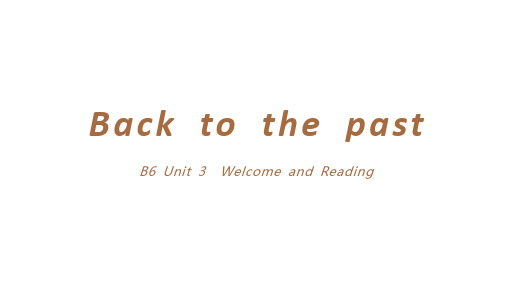
Welcome to the unit
• If you had such a time machine, would you like to travel back to the past ? or to the future?
• Why?
Sailing the oceans
What difficulties did explorers face in the past?
Zheng He--Para 1
“A fleet of over 200 ships navigated the blue seas, with almost 28,000 people on board, which was a splendid scene. It would take 500 years before a larger fleet salied the seas. According to some records, the largest ships were over 140 metres in length...”
• poor navigational tools • lack of adequate supplies • sickness and starvation. • fear of the unknown.
Zheng He--Para 1
• How does the author begin his article?
Voyages of Zheng He
Zheng He--Para 2-3 • What’s the far-reaching impcat of Zheng He’s voyages?
Zheng He--Para 4
牛津译林版 模块三Unit3 reading(共27张PPT) (1)

阅读理解训练
1. From the passage, we can learn that __D____. A. Ann traveled many places in eleven days. B. Pompeii had been a rich city before the Romans took
⑴ dates and place names
⑵ facts and historical information
⑶ personal feelings and opinions
Pompeii (庞贝)
Task1(Diary1-3): Read this part and answer:
1. Where’s Pompeii? 2. What happened to Pompeii in August AD 79? 3. How was the buried city discovered? 4.What were the stepping stones along the road
I saw the ancient Roman city of Pompeii.
How unfortunate How amazing
Loulan (楼兰)
Task22( Diary 4-5 ):
1. Why was Loulan like about 2,000 years ago?
The commercial city was busy and wealthy about 2,000 years ago.
The Great Wall
The Terracotta Warriors
Potala Palace
The Old Town of Lijiang
牛津译林版 模块三Unit3 reading(共27张PPT)

Pompeii in the past
The volcano of Mt. Vesuvius
After the volcano!!!
All the people in the city were buried alive!
Pompeii today after rebuilding.
Find the historical information about Pompeii.
1.What happened to Pompeii on 24 August AD 79?
2. How was Pompeii discovered?
3. What were the stepping stones along the road in Pompeii used for?
4. Why was Loulan an important city about 2,000 years ago?
Find the historical information about Loulan.
time
event
2000 years ago It existed as a commercial city.
Loulan from AD 200 It was covered over to AD 400 gradually by sandstorms.
2. What is one main similarity between the two city?
Both of them became lost civilizations about 2,000 years ago.
3. How many parts can be the text divided into?
牛津译林版 模块三Unit3 reading(共22张PPT)
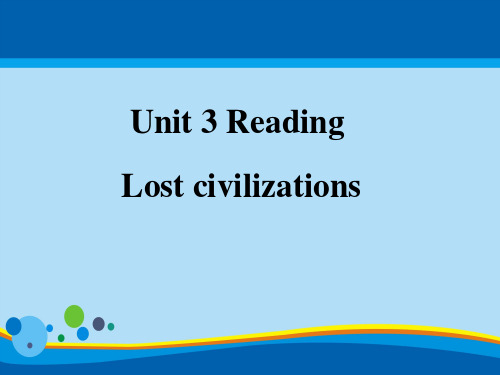
3.How do many people think Loulan disappeared? (no more than 13 words)
erupted.
阅读理解训练
3. What is NOT true about Loulan? A. It was on the famous Silk Road. B. It was a wealthy commercial city. C. It disappeared suddenly. D. It was discovered by Sven Hedin. 4. The purpose of the passage is to ______. A. tell us a travel experience in Pompeii and Loulan. B. offer us some information about ancient civilizations. C. introduce a cultural expedition(考察) to two sites of lost
Detailed reading
Task1
阅读理解训练
1. From the passage, we can learn that __D____. A. Ann traveled many places in eleven days. B. Pompeii had been a rich city before the Romans took
3. Can you name some buildings that could represent ancient civilizations in China?
Unit3Reading课件牛津译林版九年级英语下册

合作探究
③Why did Mr Jiang decide to return the robot to the robot shop? Because the robot can also be too much trouble./ Because the robot brings too much trouble to Mr Jiang.
合作探究
2.阅读短文第一段,填表。
Who ① Mr Jiang
Job What Why
② A manager ③ Ordered a robot from a robot shop
Wanted to④ have more free time/have time to relax
合作探究
3.阅读短文2~4段,填空。
合作探究
阅读训练 ·导学建议·
1.引导学生画出每段的关键词,为复述短文提供帮助。 2.准备机器人发展历程的视频,以供学生观看。 ◎学法指导:给文章分段,并尝试写出每段的大意,理清文章思 路,从而更好地理解作者的意图。
合作探究
1.听短文录音,回答问题。 ①What is the passage about? Mr Jiang and his robot. ②Did the robot help a lot with Mr Jiang’s life in the beginning? Yes, it did.
合作探究
用所给单词的适当形式填空。 1.The passengers are not allowed to smoke (smoke) on the
train. 2.The passengers don’t allow smoking (smoke) on the
最新牛津英语模块三Unit3 Reading
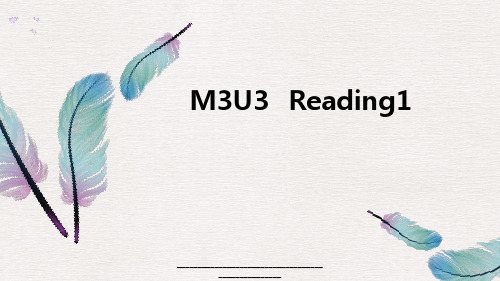
In Italy
went to a lecture about Pompeii
saw the ancient city of Pompeii
arrived in Loulan
A scholar told them 25th July some information ___________________________________
⑵ facts and historical information
⑶ personal feelings and opinions ___________________________________ _______________
Date
Arrangements
15th July 16th July 17th July
_______________
Guidance & Exploration
___________________________________ _______________
Listen to the tape and choose the correct main idea for each part.
___________________________________ _______________
Guidance & Exploration
优化探究P47-48
step1 fast-reading 单选
___________________________________ _______________
2. know the main idea of the text 3. arouse the awareness of protecting cultural
(完整版)模块三牛津高中英语课文翻译
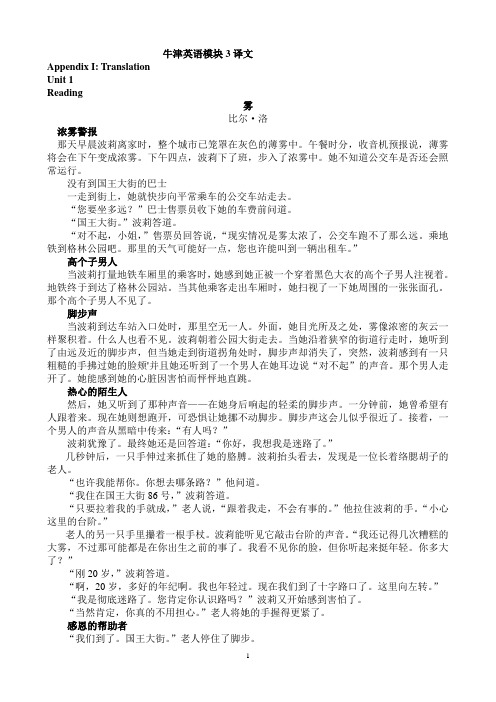
牛津英语模块3译文Appendix I: TranslationUnit 1Reading雾比尔·洛浓雾警报那天早晨波莉离家时,整个城市已笼罩在灰色的薄雾中。
午餐时分,收音机预报说,薄雾将会在下午变成浓雾。
下午四点,波莉下了班,步入了浓雾中。
她不知道公交车是否还会照常运行。
没有到国王大街的巴士一走到街上,她就快步向平常乘车的公交车站走去。
“您要坐多远?”巴士售票员收下她的车费前问道。
“国王大街。
”波莉答道。
“对不起,小姐,”售票员回答说,“现实情况是雾太浓了,公交车跑不了那么远。
乘地铁到格林公园吧。
那里的天气可能好一点,您也许能叫到一辆出租车。
”高个子男人当波莉打量地铁车厢里的乘客时,她感到她正被一个穿着黑色大衣的高个子男人注视着。
地铁终于到达了格林公园站。
当其他乘客走出车厢时,她扫视了一下她周围的一张张面孔。
那个高个子男人不见了。
脚步声当波莉到达车站入口处时,那里空无一人。
外面,她目光所及之处,雾像浓密的灰云一样聚积着。
什么人也看不见。
波莉朝着公园大街走去。
当她沿着狭窄的街道行走时,她听到了由远及近的脚步声,但当她走到街道拐角处时,脚步声却消失了,突然,波莉感到有一只粗糙的手拂过她的脸颊'并且她还听到了一个男人在她耳边说“对不起”的声音。
那个男人走开了。
她能感到她的心脏因害怕而怦怦地直跳。
热心的陌生人然后,她又听到了那种声音——在她身后响起的轻柔的脚步声。
一分钟前,她曾希望有人跟着来。
现在她则想跑开,可恐惧让她挪不动脚步。
脚步声这会儿似乎很近了。
接着,一个男人的声音从黑暗中传来:“有人吗?”波莉犹豫了。
最终她还是回答道:“你好,我想我是迷路了。
”几秒钟后,一只手伸过来抓住了她的胳膊。
波莉抬头看去,发现是一位长着络腮胡子的老人。
“也许我能帮你。
你想去哪条路?”他问道。
“我住在国王大街86号,”波莉答道。
“只要拉着我的手就成,”老人说,“跟着我走,不会有事的。
”他拉住波莉的手。
“小心这里的台阶。
- 1、下载文档前请自行甄别文档内容的完整性,平台不提供额外的编辑、内容补充、找答案等附加服务。
- 2、"仅部分预览"的文档,不可在线预览部分如存在完整性等问题,可反馈申请退款(可完整预览的文档不适用该条件!)。
- 3、如文档侵犯您的权益,请联系客服反馈,我们会尽快为您处理(人工客服工作时间:9:00-18:30)。
Reason of disappearance
Pompeii
Loulan
1. famous 2. long history 3. disappeared
Italy
eruption of volcano
sandstorms
China
gradually
Pompeii in 2. Italy In the 8th century BC Volcano 4. eruption
Disappearance About 3.2,000 years ago From AD 200 to AD 400
Discoverer
A 6. farmer
Sven Hedin,an European explorer
M3U3 Reading1
Lead-in
Last period we have learnt many splendid buildings and objects.
What are the similarities and differences among these places? Can you use some words to describe them?
place Loulan from AD 200 to AD 400 Around the years 1900 time 2000 years ago evevt
It existed as a commercial city. It was covered over gradually by sandstorms.
commercial A small wealthy,9.
A rich city city,a 10. stopping and a green land point
Find the historical information about Pompeii.
place time evevt
in the 8th century BC
15th July
16th July 17th Jud in Loulan A scholar told them some information
25th July
Guidance & Exploration
Listen to the tape and choose the correct main idea for each part.
Pompeii
It was founded. It was taken over by the Romans. The volcano erupted. It was put under government protection.
in 89 BC
on 24th Aug. AD 79
in 1860
Find the historical information about Loulan and fill in the blanks:
So we call the ancient buildings, cultures and countries that no longer existed “Lost civilizations”.
Back to the past
Lost civilizations
Learning aims
⑴ dates and place names
⑵ facts and historical information personal feelings and opinions ⑶
Date
Arrangements In Italy
went to a lecture about Pompeii saw the ancient city of Pompeii
Self-study
What should we pay attention to when we are reading diaries? When you are reading diary entries recording someone’s travels, you should look for:
At the end of the class, we will be able to:
1. master the reading strategy: reading diary entries (词目,条目) 2. know the main idea of the text 3. arouse the awareness of protecting cultural relics (遗迹)
Diary 1 Diary 2 Diary3 Diary 4 Diary 5 A . a lecture about Pompeii and the volcano B. a visit to the ancient Roman city of Pompeii city C. general information about Loulan D. the purpose and destination of the trip E. the discovery of the Loulan kingdom
It was discovered by a European explorer.
Summary
What are the similarities and differences between Pompeii and Loulan?
Differences Place Similarities Nation How to disappear suddenly
caused by human beings
Consolidation
完成报纸34期第二版语法填空
Assignments
The scene the author saw The scene before the city was buried
Streets,houses and City walls,palaces,temples, bodies of people 7.buried alive workshops,towers and an ancient water 8. system
attractive
Magnificent
mysterious ancient
well-designed Similarities famous
distant
Difference
Some of them are still existing now, but the others are nowhere to be seen.
Guidance & Exploration
优化探究P47-48
step1 fast-reading 单选
Step 2 Careful Reading Read the text and fill in the blanks. The 1. purpose of the trip Destination Foundation Cause To see the lost civilizations Loulan in China About 2,000 years ago 5.Sandstorms
